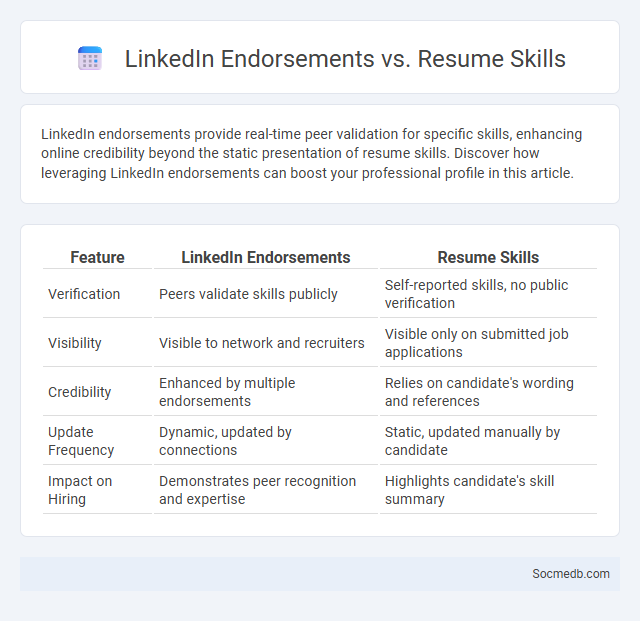
Photo illustration: LinkedIn Endorsement vs Resume Skills
LinkedIn endorsements provide real-time peer validation for specific skills, enhancing online credibility beyond the static presentation of resume skills. Discover how leveraging LinkedIn endorsements can boost your professional profile in this article.
Table of Comparison
| Feature | LinkedIn Endorsements | Resume Skills |
|---|---|---|
| Verification | Peers validate skills publicly | Self-reported skills, no public verification |
| Visibility | Visible to network and recruiters | Visible only on submitted job applications |
| Credibility | Enhanced by multiple endorsements | Relies on candidate's wording and references |
| Update Frequency | Dynamic, updated by connections | Static, updated manually by candidate |
| Impact on Hiring | Demonstrates peer recognition and expertise | Highlights candidate's skill summary |
Understanding LinkedIn Endorsements: An Overview
LinkedIn endorsements serve as a credible validation of a user's skills and expertise, enhancing profile visibility and professional reputation. These endorsements, which appear prominently on LinkedIn profiles, influence recruiters and potential employers by highlighting verified competencies. Understanding the strategic use of endorsements can significantly improve networking opportunities and career growth on the platform.
What Are Resume Skills? Key Differences
Resume skills refer to specific abilities and expertise that demonstrate your qualifications and suitability for a job, often divided into hard skills such as technical proficiency and soft skills like communication. In social media roles, resume skills typically highlight digital marketing tools, content creation, and analytics, distinguishing them from general skills by their relevance to platform management and audience engagement. Understanding these key differences helps tailor resumes to effectively showcase the most impactful experience and capabilities in the social media industry.
LinkedIn Endorsements vs Self-Listed Skills
LinkedIn Endorsements serve as credible social proof, boosting profile visibility and validating expertise through peer recognition, while Self-Listed Skills allow users to tailor their profiles with specific keywords that align with industry standards and job descriptions. Endorsements from connections enhance trustworthiness in the professional community, whereas self-listed skills optimize search engine results and recruiter algorithms. Balancing both strategies increases the likelihood of attracting relevant job opportunities and networking contacts.
The Credibility of Endorsements: LinkedIn vs Resume
LinkedIn endorsements offer dynamic, peer-verified validation of professional skills, enhancing credibility beyond static resume claims. Endorsements feature real-time feedback from colleagues and industry experts, providing a transparent and trustworthy assessment of expertise. This interactive platform fosters accountability and networking, which resumes alone cannot achieve.
How Recruiters View Endorsements and Resume Skills
Recruiters perceive endorsements on social media platforms as supplementary validation but prioritize verified skills listed on resumes for assessing candidate competencies. Resume skills directly linked to job requirements and supported by quantifiable achievements carry more weight in the hiring process. Social media endorsements can enhance credibility but often require substantiation through formal experience and qualifications.
Pros and Cons of LinkedIn Endorsements
LinkedIn endorsements provide a quick way for your connections to validate your skills, enhancing your professional credibility and improving your profile visibility in search results. However, these endorsements can sometimes lack authenticity, as they may come from acquaintances unfamiliar with your actual expertise, potentially diminishing their value. Balancing genuine endorsements with a comprehensive profile can help you maximize LinkedIn's networking and career opportunities.
The Impact of Endorsements on Professional Branding
Endorsements on social media significantly enhance professional branding by increasing credibility and visibility within your industry. Positive recommendations and skill validations from colleagues and clients act as powerful social proof, attracting new business opportunities and strengthening your reputation. Leveraging these endorsements strategically can position you as a trusted expert and elevate your professional profile effectively.
Best Practices for Showcasing Skills on LinkedIn and Resumes
Highlight specific achievements using quantifiable results to demonstrate skills effectively on LinkedIn and resumes. Incorporate industry-relevant keywords to optimize profiles for applicant tracking systems and search algorithms. Use a clean, organized format with tailored summaries that align with targeted job roles to capture recruiter attention.
Common Misconceptions About Skill Endorsements
Skill endorsements on social media often lead to misconceptions about a professional's expertise, as many users endorse skills without fully verifying proficiency. You might find inflated endorsements that do not accurately reflect real-world abilities, which can mislead potential employers or collaborators. Understanding the distinction between genuine endorsements and superficial approvals is crucial for both giving and receiving meaningful validation.
Choosing the Right Mix: Optimizing Skills for Job Applications
Choosing the right mix of social media skills can significantly enhance your job applications by showcasing your ability to navigate platforms like LinkedIn, Twitter, and Instagram strategically. Demonstrating expertise in content creation, analytics interpretation, and community engagement highlights your adaptability and digital marketing proficiency. Tailoring your social media presence to align with industry trends and employer expectations strengthens your candidacy and increases your chances of landing the desired role.
 socmedb.com
socmedb.com